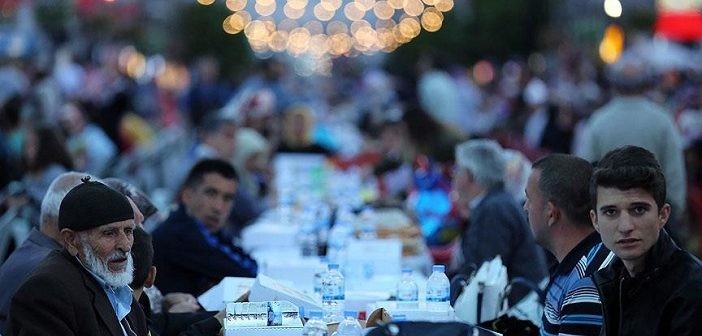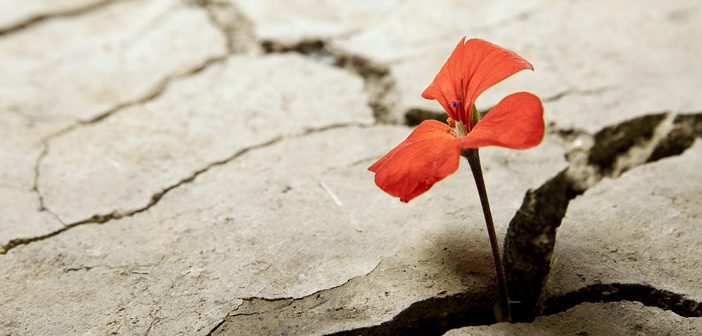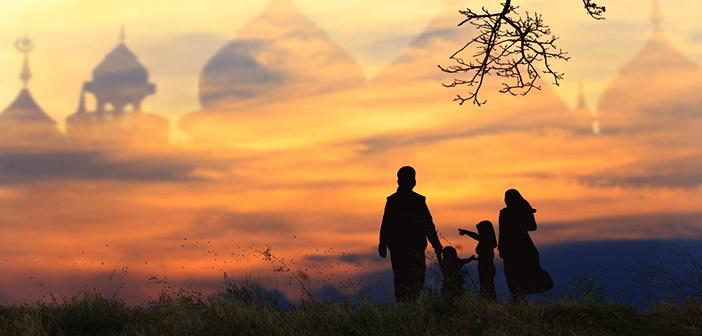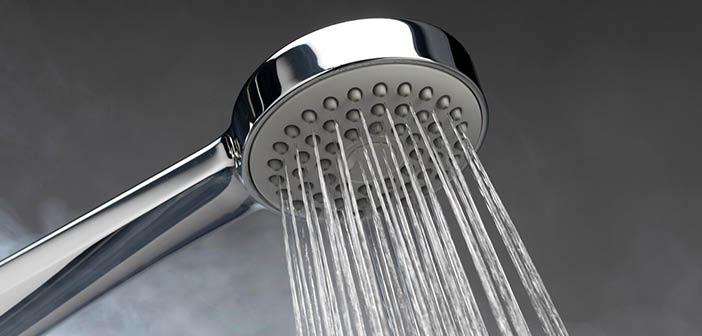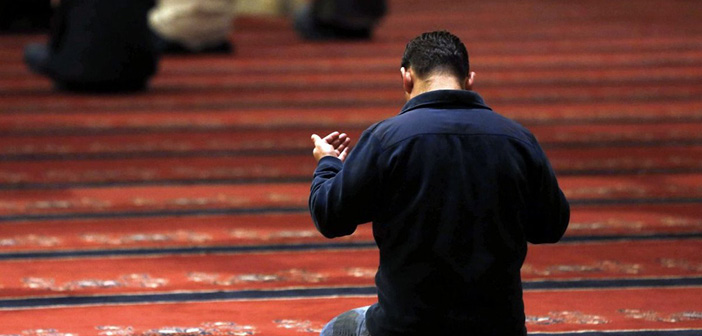
The Conditions For The Validity of Ritual Prayer (Shafii)
What is the validity of ritual prayer?
- CLEANSING FROM HADATH: Being cleansed from ritual impurity (by performing minor ablution (wudu’) or major ablution (ghusl)) is a prerequisite of prayer. Allah has ordained minor or major ablution under necessary circumstances: “O you who believe! When you rise up for prayer, wash your faces, and your hands up to the elbows, and lightly rub your heads and (wash) your feet up to the ankles. And if you are unclean (junub), purify yourselves …?” (al-Ma’idah: S: 6) The Prophet (pbuh) said: “The prayer of a person who does Hadath (passes urine, stool or wind) is not accepted (by Allah) till he performs the ablution.”[1]
- CLEANSING FROM NAJASAH: If the believer who will perform ritual prayer has material impurities more than the excused amount on his/her body, clothes or at the place where he/she will perform prayer, this impurity must be cleansed before prayer. If one performs a prayer without being aware of an impure material more than the excused amount on his/her body or clothes and then sees it after finishing the prayer, he/she needs to re-perform the prayer.
If a person sees something impure on another believer who is about to perform prayer, he needs to warn that person. If the congregation recognizes something impure on the imam after completing a prayer, the whole congregation needs to re-perform the prayer.
If clean and dirty clothes are mixed, one should investigate to discover the clean ones. If one does not know which part of a cloth is dirty, the whole cloth should be washed. If one is imprisoned in a dirty place, he/she should the try to find a place that is the cleanest so as to perform the prayer. In this case, he/she should perform prostration by bowing his/her head down, but not by placing the head on the dirty place.
- SATR AWRAH (COVERING CERTAIN PARTS OF THE BODY): It means that one who is going to perform the prayer must cover certain parts of the body. A believer should pay the utmost attention to wear his/her best and most appropriate clothes when standing in the presence of Allah, the Lord of the Worlds.[2]
It is obligatory for men to wear clothes covering the area between their navel and knees. The Messenger of Allah (pbuh) said, “Man’s awrah is between his navel and knees.”[3] It is Sunnah for men to wear upper clothes to cover the shoulders during prayer.
It is obligatory for the free Muslim women to cover their entire body except their faces and hands. It is not permissible to perform the prayer in transparent clothes. Wearing tight clothes showing the form of the body, on the other hand, is reprehensible. Women’s naked feet should not be seen when looked from the sides. It is reprehensible for women to perform prayer by covering their faces.
Even if a believer does not have clothes to cover the necessary parts of his/her body or have dirty clothes, or does not have any clothes, he/she still must perform prayer in time. In such a prayer, one should fully perform the bowing (ruku’) and the prostration (sajda) and he/she does not need to re-perform the prayer later.
- ISTIQBAL QIBLAH: It means to face the direction of qiblah while performing the prayer. The believers’ qiblah is the Ka’bah in Mecca. A diversion of 45 degrees to the right or to the left from the point of the Ka’bah is not considered as not turning towards the qiblah.
A traveler may perform the prayer on the mount. When performing a prayer on a big vehicle like a ship, one should try to turn towards the direction of the qiblah. If it is not possible to perform the prayer in such a way while on a moving ride or a vehicle, turning towards the direction of the qiblah at the beginning of the prayer is obligatory if possible. If it is possible to stop at a resting place and perform prayer there, one should do so. When performing a supererogatory prayer, it is not required for a traveler to turn towards the direction of the qiblah.
The person who performs prayer in times of great fear like war times does not have to turn towards the direction of the qiblah. If it is possible to turn towards the qiblah under such circumstances, then he/she should try to perform the prayer towards the direction of the qiblah. In these cases, the obligatory status of turning towards the qiblah is stronger than the obligation of standing while in prayer.
One who cannot turn towards the qiblah due to health problems, or cannot find anybody to turn him/her towards the qiblah, should perform the prayer towards the direction he/she can turn and make the prayer up when he/she gets well.
- WAQT (TIME): It is obligatory to know the prescribed times of prayer and to perform them in their proper times. One may know the times of prayer in three ways:
- a) The events related to the times of prayer such as sunset can be known by seeing it or by getting its information from a reliable person.
- b) By employing independent reasoning or using scientific data to determine the times of prayer.
- c) By following someone who has already determined the times of prayer by using his independent reasoning.
If one performs prayer without knowing that it is the prescribed time of the prayer, it does not become a valid prayer even if he/she realizes that it is performed in its prescribed time. It is expressed in the Holy Qur’an: “…For such prayers are enjoined on believers at stated times.” (al-Nisa 4: 103) It is more virtuous to perform a prayer as soon as its prescribed time arrives without delaying it. It is a major sin to postpone a prayer after its prescribed time without a valid excuse.
The Prescribed Time of the Dawn Prayer: (subh) begins at true dawn and ends at sunrise, though the preferred time for it ends when it becomes light outside after which the merely permissible remains. If one cannot wake up for the appropriate prescribed time of the dawn prayer despite best efforts to wake up, dawn prayer together with its Sunnah cycles can be made up until the sun’s zenith (istiwa) for that day.
The Prescribed Time of the Noon or the Friday Prayer: (zuhr) begins after the sun’s zenith for that day, and ends when an object’s shadow, minus the length of its shadow at the time of the sun’s zenith, equals the object’s height. In cases when a valid excuse such as being on a journey etc. exists, the noon prayer can be performed by combining it with the late afternoon prayer.
The Prescribed Time of the Late Afternoon Prayer: (‘asr) begins at the end of the noon prayer’s time and ends at sunset, though when an object’s shadow is twice as long as the object’s height, the preferred time is over, and the merely permissible time remains.
The Prescribed Time of the Evening Prayer: (maghrib) begins when the sun has completely set. It continues until the red color disappears from the sky. One should pay attention to perform this prayer without delaying it. In cases when a valid excuse such as being on a journey etc. exists, the evening prayer can be combined with the night prayer.
The Prescribed Time of the Night Prayer: (‘isha) begins when the red color of the sunset recedes from the sky, and ends at true dawn (al-fajr al-sadiq) when the sky around the horizon begins to grow light. Before this event, a dim light sometimes appears overhead for some minutes, followed by darkness. This phenomenon is categorized as the deceptive dawn (al-fajr al-kadhib). Postponing the night prayer to the end of the night without an excuse is reprehensible.
The Prescribed Time of the Tarawih Prayer: is particular to the month of Ramadan and its time begins after the performance of the night prayer and continues until the beginning of the time of the dawn prayer.
The Prescribed Time of the Witr Prayer: is after the time of the night prayer and continues until the beginning of the time of the dawn prayer. It is most appropriate to perform this prayer as the last prayer of a day after midnight prayer (tahajjud) and after the tarawih prayer in the month of Ramadan.
The Time of the Festival Prayer: begins after the sun rises one or two spears height (about 45 minutes after the sun rise) and continues until the sun reaches its zenith.
Times in which performing the prayer is reprehensible are as follows:
- When sun is rising: This is a 40-minute long time in winter or about 50-minute long time in summer after the sunrise.
- When the sun is at its height at midday till it passes over the meridian i.e. the time of noon prayer begins. This is about 25 minutes in winter and 35 minutes in the summer.
- When the sun is setting: This time begins about 40 minutes before the sunset in the winter and about 50 minutes before the sunset in the summer and continues until the sunset.[4]
It is not permissible to perform prayer in the above-mentioned three times of the day. “There were three times at which Allah’s Messenger (peace and blessings be upon him) forbade us to pray, or bury our dead: When the sun begins to rise till it is fully up, when the sun is at its height at midday till it passes over the meridian, and when the sun draws near to setting till it sets.”[5]
It is a general rule that supererogatory prayers cannot be performed during the reprehensible times of the day. Moreover, it is reprehensible to perform the supererogatory prayers after performing the obligatory cycles of the dawn and the late afternoon prayers. On Fridays, because there is no reprehensible time before the Friday Prayer, one may perform the supererogatory prayers after the sun passes the meridian.
Prayers that are linked to specified rationales can be performed during the reprehensible time. These prayers are as follows:
1- Make-up (qada) prayer.
2- Funeral prayer.
3- Prayer performed after the circumambulation of the Ka’bah.
4- Prayer performed in Masjid al-Haram.
5- Prayer performed to greet a mosque (Tahiyyat al-masjid).
6- Prayer performed at times of eclipse (Salat al-Husuf and Salat al-Kusuf)
7- Prayer performed to ask rain from Allah (salat al-istisqa)
8- Two cycles of prayer performed after the performance of ablution
It is permissible for a Muslim to perform the prostration of recitation when a verse of prostration is recited, even if it is a reprehensible time. However, it is not acceptable if one intentionally at a reprehensible time recites one of the verses of prostration or if one delays to perform the prostration of recitation to a reprehensible time. By the same token, it is not permissible to intentionally delay the make-up prayer or the funeral prayer to a reprehensible time.
It is more virtuous to perform the dawn prayer in its earliest time while it is still dark (taghlis). According to the Hanafi madhhab it is recommended to perform the Dawn Prayer after it becomes light outside (isfar) i.e. about 40 minutes before sunrise.
The Noon Prayer can be postponed a little if it is too hot to perform it in its earliest time.
If the obligatory cycles of the late afternoon prayer, due to a valid reason, are not performed during its normal time then they can be performed until sunset. However, postponing it for such a late time is regarded as reprehensible. Allah’s Messenger –peace and blessings be upon him- said: “The prayer of the hypocrites is that one of them sits until the sun becomes yellow and is between the horns of Shaytan, or on the horn of Shaytan, and then gets up and rattles off four cycles, hardly remembering Allah in them at all.” [6]
It is not appropriate to perform the evening prayer after the stars have covered the sky. Our Prophet (pbuh) said: “My community will remain well, or he said: will remain on its natural condition, so long as it would not delay the evening prayer until the stars shine brightly just like a network.”[7]
It is not appropriate to postpone the night prayer up until the second half of the night.
- TO KNOW HOW TO PERFORM PRAYER: This condition is a requirement to perform a prayer properly. This is because a prayer should be performed by contemplating it, reciting the Qur’an in a proper way, and seeking the contentedness of Allah. In order to achieve this, one should know the verses from the Qur’an, the invocations of the prayer, and the rules of how to perform a prayer.
The prayer of someone who does not even know the time of the prayer that he is performing, and who cannot even distinguish between the obligatory and the Sunnah cycles of the prayer he is performing are not deemed as acceptable.
- NOT TO CARRY OUT ACTS THAT NULLIFY PRAYER: For the validity of a prayer it is necessary that one should not do any actions, such as speaking, eating, and drinking, that nullify a prayer.
[1] Al-Bukhari, Wudu 2[2] “O Children of Adam! wear your beautiful apparel at every time and place of prayer…” (al-A’raf, 7: 31)[3] Ahmad b. Hanbal, II, 187[4] The above mentioned times are applicable to Turkey. Depending on the angle of the sunbeams, they change and may fall as low as twenty minutes by getting closer to Equator[5] Muslim, Musafirin 293[6] Malik, Muwatta’, Qur’an 46[7] Abu Dawud, Salat 6
Source: Fiqh1 (According To The Shafi’i School Of Islamic Law), Erkam Publications
The Definition of The Science of Fiqh (Shafii)
The Importance of The Science of Fiqh (Shafii)




